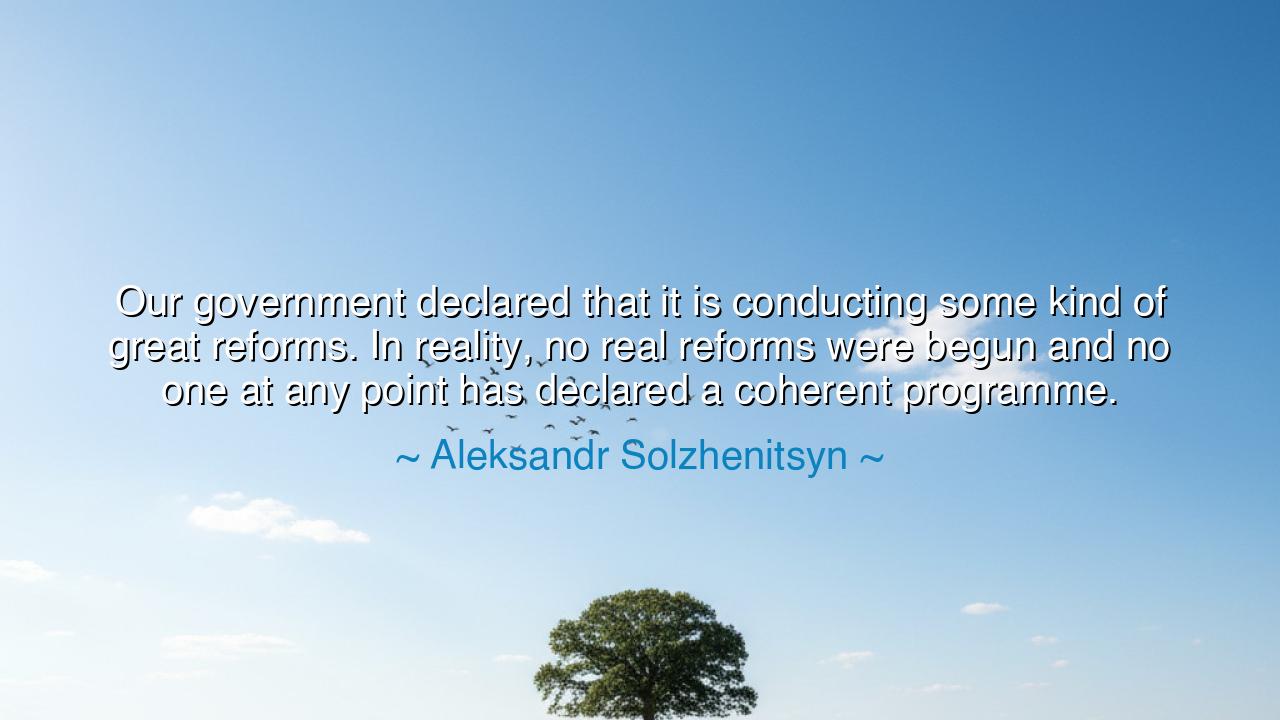
Our government declared that it is conducting some kind of great
Our government declared that it is conducting some kind of great reforms. In reality, no real reforms were begun and no one at any point has declared a coherent programme.






The words of Aleksandr Solzhenitsyn, survivor of tyranny and prophet of truth, carry the weight of both history and conscience: “Our government declared that it is conducting some kind of great reforms. In reality, no real reforms were begun and no one at any point has declared a coherent programme.” In this lament, Solzhenitsyn exposes the deception that cloaks the corruption of power — the false promise of change that conceals the decay of the soul of governance. He speaks as one who had seen the machinery of lies grind down nations and turn truth itself into an enemy of the state. His warning is as old as civilization: beware the reformer who speaks loudly but builds nothing, for his words are the perfume of decay.
At the heart of this quote lies the contrast between appearance and reality. Solzhenitsyn was not merely criticizing political inefficiency — he was unmasking a deeper rot: the deliberate illusion of progress used to placate the people while maintaining oppression. When governments boast of “reforms” without principles, when they announce renewal without conviction, they do not heal the body of the nation — they poison it with false hope. The people are lulled into apathy, believing that change is happening, while in truth, the roots of injustice grow deeper beneath the surface. Thus, Solzhenitsyn calls out the danger of hollow rhetoric — the betrayal of words divorced from action, of governance without moral compass.
The origin of this insight comes from the dark soil of the Soviet Union, where Solzhenitsyn himself endured years in the gulags for speaking truth. After surviving that frozen hell, he emerged to find his homeland still bound by hypocrisy. The regime of his time often proclaimed “reform” — whether in agriculture, culture, or administration — but these were reforms in name only, designed to deceive both the people and the world. There was no coherent programme, no moral vision, no desire for freedom. The words of progress were repeated like a litany, while the machinery of control remained untouched. Solzhenitsyn, who believed that truth is the foundation of freedom, saw that such false reforms were worse than inaction — for they corrupt the very meaning of reform itself.
History has often echoed this same tragedy. Consider the French Revolution, which began with the cry for liberty, equality, and fraternity. In its early years, it promised to rebuild society on justice and reason. But soon, its leaders — consumed by ambition and paranoia — turned reform into bloodshed and tyranny. The slogans remained, but the spirit was lost. What had begun as liberation became the Reign of Terror. Similarly, in the modern age, many nations have announced grand reforms only to entrench the same power structures under new names. The faces change, the banners shift, but the people remain unfree. Solzhenitsyn’s words speak to all such ages — to remind us that reform without righteousness is illusion, and change without truth is corruption.
And yet, within his despair lies a quiet call to courage. Solzhenitsyn believed that the moral regeneration of a nation does not begin in parliaments or ministries — it begins in the hearts of individuals. When he said no “coherent programme” had been declared, he was not only accusing the rulers; he was mourning the silence of the people. True reform, he implies, requires clarity of purpose — a vision grounded in moral truth, not political convenience. It demands men and women who will speak with honesty, act with integrity, and endure hardship for the sake of justice. A government that lacks such people cannot reform itself; it must be reformed by those who dare to live as witnesses to truth.
Thus, his message transcends its Soviet context. It is a warning for every age where leaders boast of “transformation” while serving only themselves, where propaganda replaces transparency, and where people grow weary of demanding accountability. Solzhenitsyn reminds us that moral cowardice in the citizenry is the seed of despotism, and that freedom dies not by violence alone but by deception and forgetfulness. The greatest danger to any society is not the absence of reform, but the acceptance of false reform — a system where words have no meaning and promises no honor.
The lesson of Solzhenitsyn’s wisdom is clear and eternal: truth is the first reform. No nation can heal itself by lies, no leader can guide without integrity, and no people can be free without demanding honesty from those who rule. Real change begins not with declarations, but with coherence — the harmony between what is said and what is done. Therefore, each generation must learn to see through illusion, to question empty words, and to measure reform not by speeches but by the justice it brings.
So let these words endure as both warning and challenge: do not be deceived by the sound of trumpets if no walls are built; do not mistake motion for progress or promises for principles. For governments rise and fall, but truth remains eternal. And when reform is born from truth — when it serves not power but conscience — then, and only then, is it worth the blood, the faith, and the defense of a free people.






AAdministratorAdministrator
Welcome, honored guests. Please leave a comment, we will respond soon